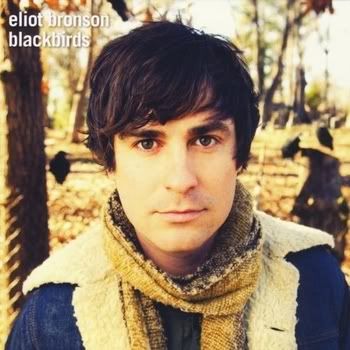
[purchase]
Blackbirds is an album of songs about loss. That tells you everything and nothing. There are many ways to write songs about loss, and many ways to sing them. Eliot Bronson focuses on the loss of love and the loss of youth. He could be bitter or angry, or he could deliver of set of songs that are maudlin or even outright depressing. But instead, Bronson delivers a set of songs that approach their subjects with a delicacy and grace that makes them ring far truer emotionally than any of these other approaches would have. Bronson is an unusual singer, in that he has a strong high tenor that allows him to occasionally slide into falsetto without losing any expressiveness. I once wrote a piece about how Art Garfunkle’s voice was not always suited to his material or his arrangements. Eliot Bronson avoids one part of that problem, because he writes his own songs, and he knows exactly how to write for his voice. He avoids the other part because his arrangements have a light touch that allows his voice to shine. The background vocals by Leah Calvert are the perfect finishing touch. Calvert provides low harmonies, sometimes almost at a whisper, and her voice and Bronson’s blend beautifully.
Before I go on, I should say at once that Eliot Bronson has a wider expressive range than Art Garfunkle. Bronson can certainly do those soaring high vocals, but there is also a slight grab in his voice that gives it more gravitas. Bronson’s main instrument is the acoustic guitar, which he picks rather than strums. To that, add electric or stand up bass, piano or organ or sometimes both, and drums. There is also pedal steel one song, and violin and viola on another. There is also some electric guitar. But Bronson doesn’t even use the full band on each song, so his voice gets plenty of space, and that does wonders for this set of songs. Christmas Song and If You Need to Be Free are the big productions here, so Bronson has to sing these two with more power than elsewhere. He does just fine, but the quitest songs were where he sounds best.
Blackbirds opens with Old Car. The narrator reflects on how he may not have the “best” of anything, but he has what suits him best. This is a song of contentment, and the implied loss is of the unrealistic dreams of youth. This is a man who has given up on competing with the world, and has found happiness by doing so. This is not a passionate emotion, so it’s one that you don’t find many songs about. It’s very refreshing. But there is plenty of passion here as well. In This Song, we meet a man who feels his youth slipping away, and he wants to do something completely rash to prove that he is still young. And Everywhere I Go gives us a narrator who misses his lover so much that he imagines he sees her everywhere. But I especially liked the quieter moments here. Annabel Avenue is a beautifully bittersweet reflection on a lost childhood, while the narrator of Black-Eyed Susan is running from his past. And East Atlanta Lullaby, which closes the album, sums up everything beautifully. Here is a couple who can regret things that they have done before, but who finally feel that they have reached a safe place for themselves. Old Car now gets recast as a foreshadowing, the rest of the songs record a journey, and East Atlanta Lullaby becomes a happy ending with a slight asterisk. Together, Blackbirds is a story well told, and a journey well worth taking.
Eliot Bronson: Old Car
Eliot Bronson: Annabel Avenue






0 comments:
Post a Comment